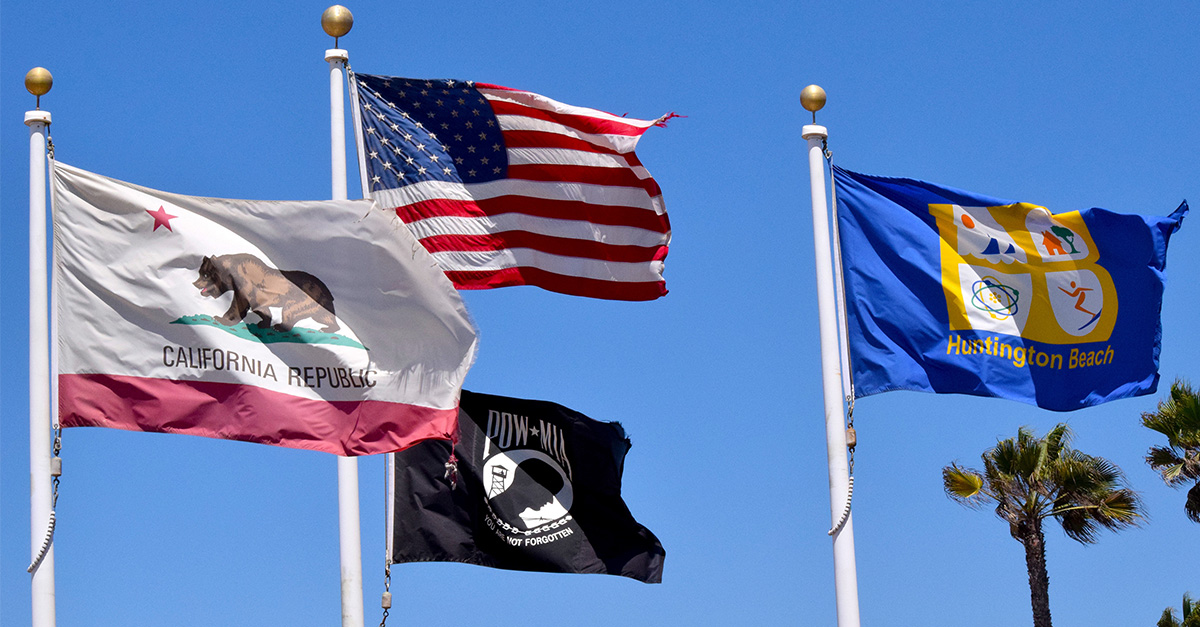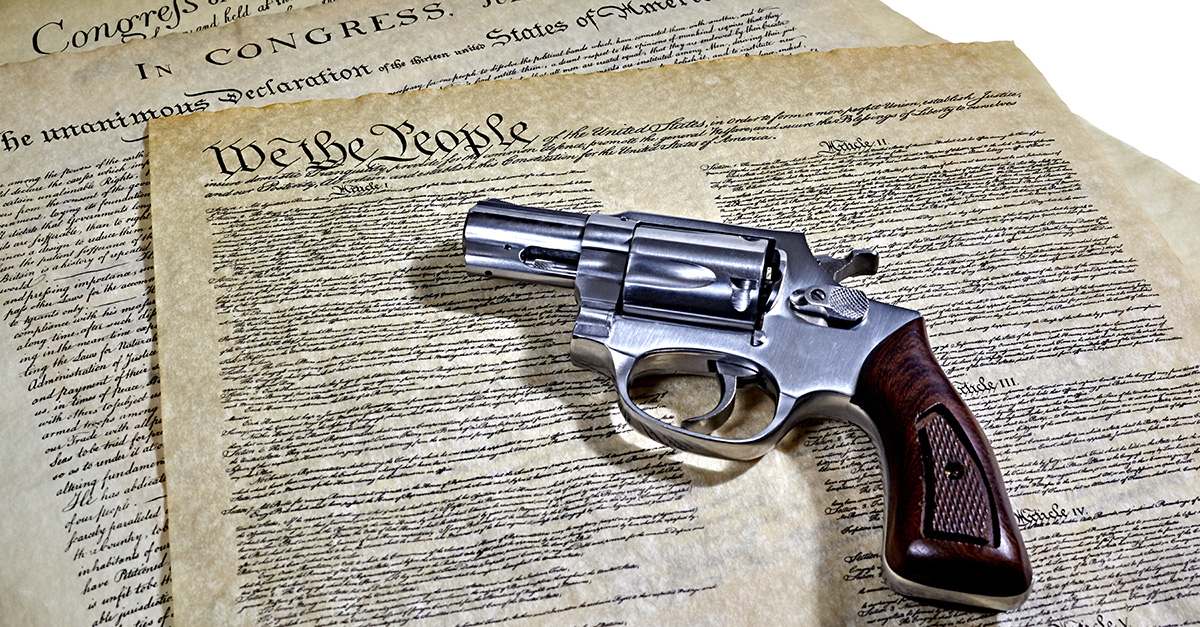


Get a free copy of Parental Rights & Education when you subscribe to our newsletter!

In the wake of the Supreme Court decision in Shurtleff v. City of Boston, the decision to stop flying any and all special interest and ideological flags on public grounds is both pragmatic and unifying.
Over 58 percent of voters in Huntington Beach, California, recently voted to ban the flying of ideological flags on public property, leaving LGBTQ activists and other detractors to complain that the city is attempting to erase LGBTQ people.
Last week, voters further affirmed their desire to remove ideologically divisive flags from public grounds by voting to approve an amendment that bans any flag other than the U.S., California, county, city, POW-MIA, and six Armed Forces flags from being flown on public property. The Olympic flag will also be permitted during the Summer Olympic games, and the City Council may approve other flags with a unanimous vote.
Proponents of the amendment claim it was intended to keep from dividing the community through government endorsement of special interests.
“Our whole goal in bringing the measure forward is to bring unity,” Mayor Gracey Van Der Mark told a local NBC affiliate.
“We wanted to remove all special interests and just focus on flags that represent all of us regardless of our race, gender, sexual orientation.”
City Councilman Pat Burns stated, “To me, it’s demeaning to the LGBQ [sic] community to fly that flag. Everybody has got something they can identify with, and I don’t believe it’s our government’s position to start playing those identity politics games.”
Critics call it an attempt to repudiate LGBTQ inclusivity.
Peg Coley, executive director of the LGBTQ Center in Orange County, called the supporters on the council “a hateful majority whose only interest is advancing an agenda of intolerance for minority communities, including LGBTQ+ individuals.”
Coley said the amendment sends a message saying, “We want LGBTQ people to be a little bit less seen and a lot less heard in Huntington Beach.”
However, the amendment says nothing about LGBT flags or any other flag being banned. Rather the amendment simply restricts flags to those representing U.S. government bodies or those unanimously approved by the council.
Meanwhile, cities in other states have also limited the number and type of flags that can be flown on government property. These include Hamtramck, Michigan, which banned flying any “religious, ethnic, racial, political, or sexual orientation group flags” on public grounds, as well as Cold Spring, New York; and Enfield, Connecticut.
The issue is also prevalent among schools. Last year, Temecula Valley Unified School District in Riverside County, California, led the way on this issue in the K-12 realm, with the school board voting to simplify the controversial issue by allowing only the U.S. and California state flags to be flown from school flagpoles.
And now Tennessee is considering legislation which would ban ideological flags from being flown in public school classrooms.

In 2022, the Supreme Court took up the case of Harold Shurtleff v. City of Boston, which involved Boston’s policy of flying flags for various groups on a third flag pole at City Hall. Boston officials allowed any group to request that their flag be flown for a day. Over time, the city received 284 different requests and approved every single one of them.
The city, for example, approved special interest flags, such as the LGBT and Black Lives Matter flags. It approved the flag of a local bank. It even approved the flags of communist China and Cuba. Yet when the city received a request from a Christian civic group to fly the Christian flag, city officials issued their first ever denial.
In a rare 9-0 ruling, the justices found that Boston had blatantly discriminated against the Christian group due to its religious viewpoint and, in so doing, had violated the First Amendment. In his concurring opinion, Justice Brett Kavanaugh argued, “Under the Constitution, a government may not treat religious persons, religious organizations, or religious speech as second-class.”
The doctrine that the government may not discriminate against a particular viewpoint, particularly a religious one, has been reaffirmed numerous times at the Supreme Court. Any time the government grants a benefit to some citizens or groups, it cannot then deny others that benefit based on their viewpoint. Essentially, if the government is going to allow the right for one to fly a flag, it must allow the right for all, whether secular or religious, domestic or foreign, friendly or hostile.
Pragmatically speaking, Huntington Beach has saved itself from the headache of having to allow virtually anyone to fly their flag on public grounds. So if the city agrees to fly the LGBT flag, it conceivably must also approve flying pro-Hamas flags, Confederate flags, KKK flags, or anything else many would find objectionable.
The city would even have to fly the Christian flag, and one can feel confident about how LGBT advocates would feel about that.
Flags convey the principles of the group that they represent. Flags have always been used for that reason by nations, and they increasingly are used by ideological groups. Those flags stand for the ideals of a nation or group. It’s why men have followed their flag into battle and been willing to die.
So when a government body flies a specific flag, it should rightly be seen as an endorsement and a celebration of the group that flag represents. And when the government can choose what groups can or can’t fly a flag on public grounds, it is tacitly prescribing what it believes is orthodox, or what is acceptable.
When a flag is flown by a government entity, it can spark anger, division, or a feeling or rejection. A person may say, “That flag doesn’t represent me!”
But the right flag can unify. As President Ronald Reagan stated in his proclamation for Flag Day and National Flag Week in 1981, “When we honor our flag we honor what we stand for as a Nation—freedom, equality, justice, and hope.”
He was poignantly summarizing the words of clergyman Henry Ward Beecher, who wrote, “A thoughtful mind, when it sees a nation’s flag, sees not the flag only, but the nation itself; and whatever may be its symbols, its insignia, he reads chiefly in the flag the government, the principles, the truths, the history which belongs to the nation that sets it forth.”
Therefore, it is a wise practice to limit the flags flown on public property to only those that bring us together around the ideals we all share — or should share — like being Americans.
Politician Pauline Hanson, in her first speech before the Australian Parliament in 1996, decried the division of Australians based on race, stating, “To survive in peace and harmony, united and strong, we must have one people, one nation, one flag.”
Our nation has become more and more divided, and Americans barely even see each other as fellow Americans anymore. We are becoming far more tied to our political and ideological affiliations or representation in a particular sect than to our common nationality and citizenship. Our government should not be furthering this divide, and it seems that the voters of Huntington Beach feel the same way.
If you like this article and other content that helps you apply a biblical worldview to today’s politics and culture, consider making a small donation here.

Notifications